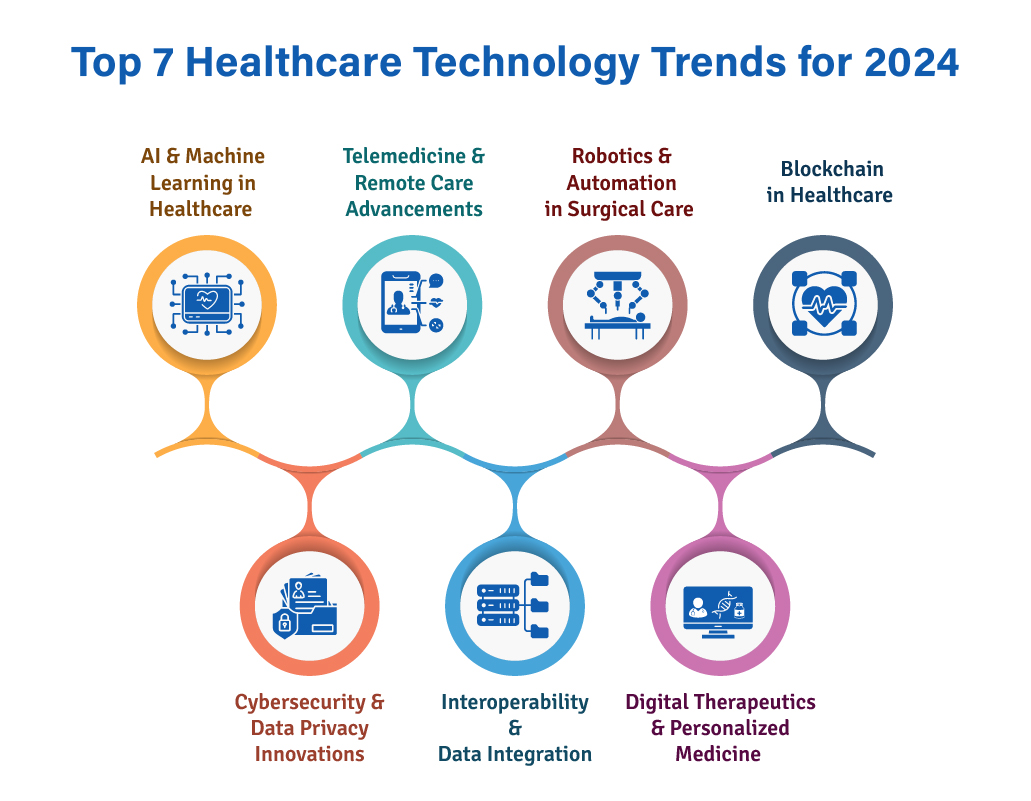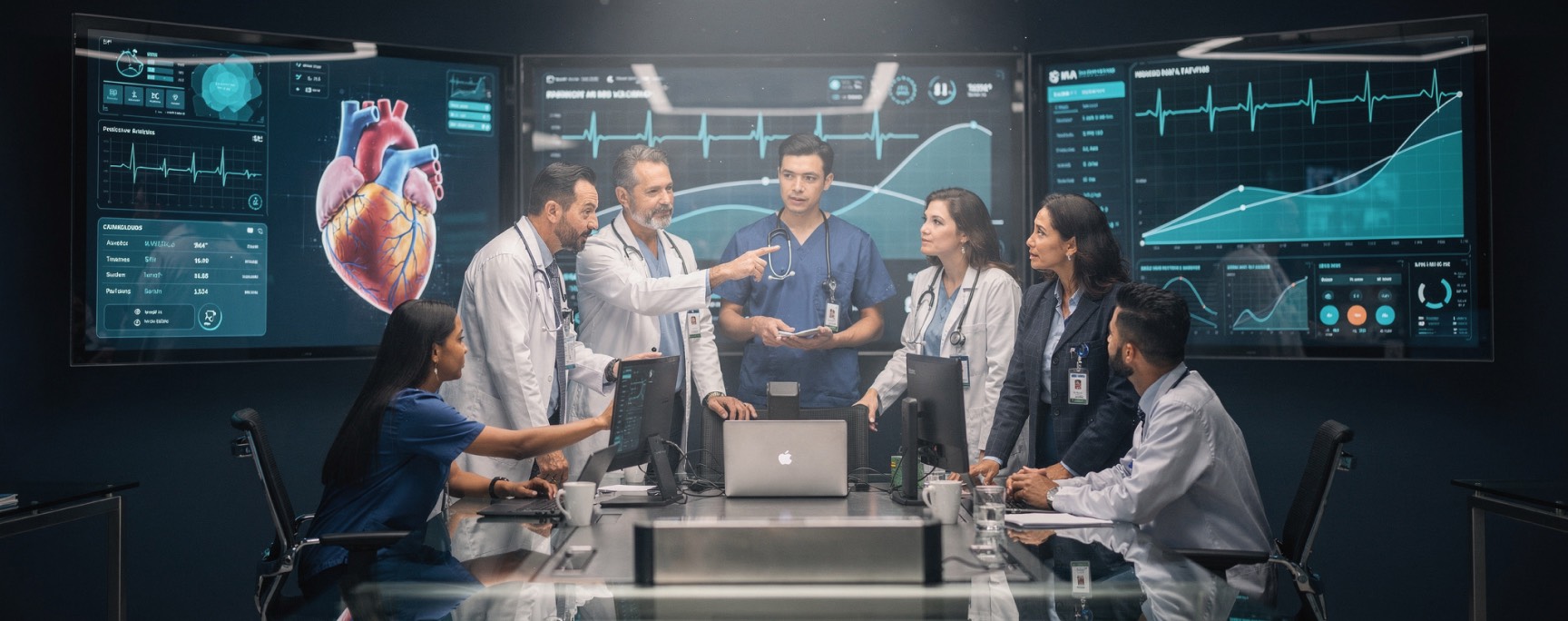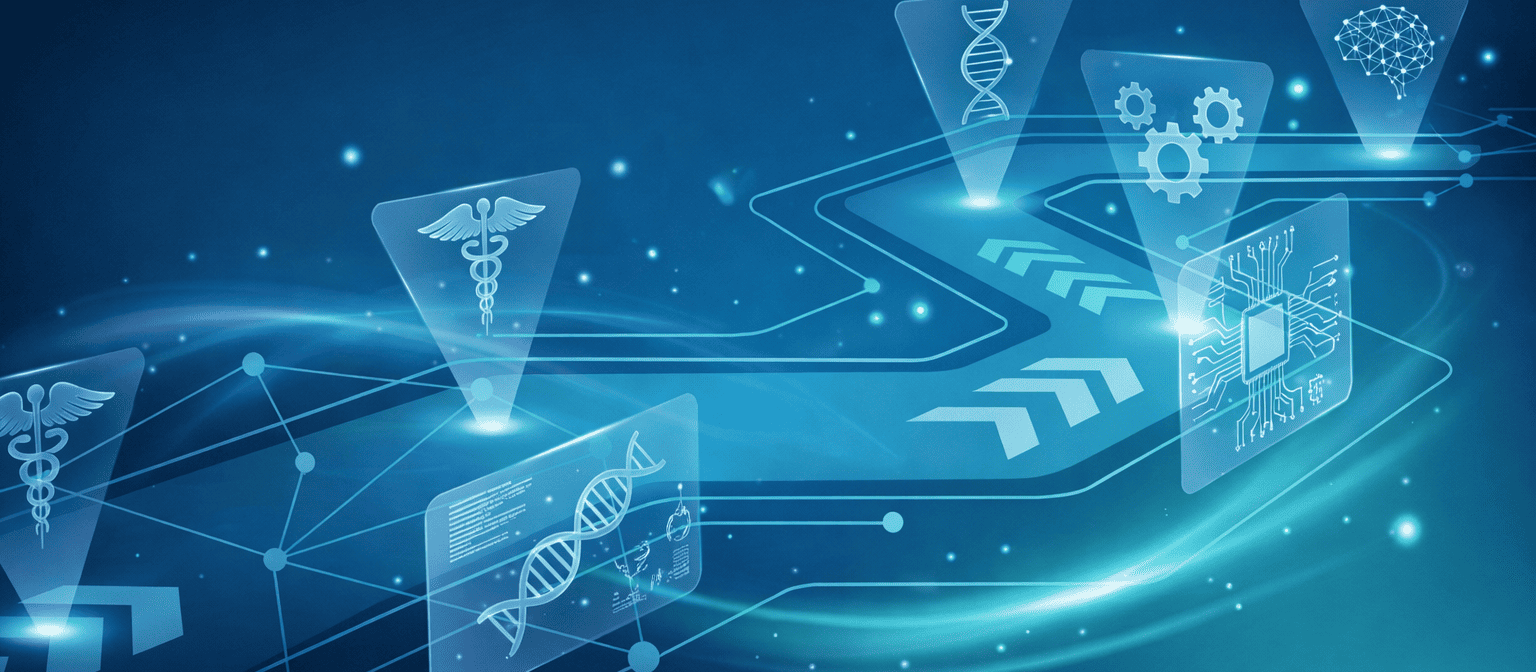Top 7 Emerging Healthcare Technology Trends for 2024
Introduction
As the healthcare sector embraces continuous transformation, technological advancements in healthcare are redefining patient care, diagnostics, and operational workflows. With the rise of emerging technologies in healthcare, companies are racing to build innovative solutions that address patient needs while enhancing the efficiency of healthcare providers. This blog explores the latest trends shaping the industry in 2024 and how healthcare businesses can adapt to these changes for sustainable growth.
Overview of the Evolving Healthcare Landscape
The healthcare industry has undergone rapid digitization in recent years. From the increased use of telemedicine during the COVID-19 pandemic to real-time patient monitoring solutions, technological advancements in healthcare are driving unprecedented changes.
Hospitals, clinics, and pharmaceutical firms need to adopt innovative medical device solutions and integrate them with software to ensure seamless operations. For companies offering embedded software development services, the demand has soared as more medical devices become smarter and connected. This is not just about patient care—it’s about building reliable ecosystems where healthcare providers, insurers, and patients are seamlessly connected.
Interoperability, data analytics, and artificial intelligence (AI) are fueling technological advancements in healthcare, allowing companies to make data-driven decisions. Below, we highlight the top emerging technologies that are poised to make the biggest impact in 2024.
Key Healthcare Tech Trends to Watch in 2024
1. AI and Machine Learning in Healthcare
Artificial Intelligence (AI) and Machine Learning (ML) are transforming healthcare delivery. Hospitals and healthcare providers are increasingly using AI tools for diagnostics, personalized treatment plans, and administrative automation. AI enables predictive analytics, allowing providers to predict patient outcomes and prevent complications before they arise.
For companies providing healthcare software development services, incorporating AI into their solutions has become essential. Medical device manufacturers are also integrating AI to create smarter, more responsive devices, contributing to technological advancements in healthcare.
2. Telemedicine and Remote Care Advancements
The shift from in-person visits to virtual care is now the new normal. Telemedicine platforms are expanding beyond video consultations to include remote patient monitoring, virtual ICUs, and wearable health devices. This shift highlights how technological advancements in healthcare improve accessibility and patient care.
Healthcare companies offering embedded software development services are playing a crucial role by developing IoT devices for remote care. These devices collect patient data and send it directly to healthcare providers, ensuring real-time monitoring and timely interventions.
Moreover, telemedicine reduces the burden on healthcare facilities while improving patient outcomes by making healthcare more accessible.
3. Interoperability and Data Integration
Interoperability is essential to achieve seamless data exchange across healthcare systems. Many hospitals still struggle with siloed data, limiting their ability to deliver efficient care. Technological advancements in healthcare are making it easier to integrate EMR-EHR systems and facilitate smooth data flow across platforms, reducing medical errors and enhancing care coordination.
With the rise of technological advancement in healthcare, the demand for healthcare software development companies offering robust interoperability solutions is growing. Standards like HL7 and FHIR facilitate smooth data sharing between different healthcare providers and systems, ensuring better patient outcomes and operational efficiency.
4. Blockchain in Healthcare
Blockchain technology is gaining traction in healthcare for its ability to provide secure, transparent data sharing. It ensures that patient records and sensitive data are tamper-proof, enabling trusted collaboration between providers, payers, and patients.
Blockchain’s potential is especially significant in clinical trials and consent management, where secure data exchange is critical. Healthcare software development companies are increasingly integrating blockchain to help providers meet compliance requirements and enhance patient trust.
5. Robotics and Automation in Surgical Care
The use of robotics continues to expand, especially in surgeries where precision is critical. Robotic-assisted surgeries minimize errors and recovery time for patients. These innovations reflect technological advancements in healthcare focused on enhancing patient outcomes and efficiency.
Streamlined Surgical Workflows for Efficient Decision-Making
Discover how a leading healthcare firm enhanced surgical workflows with a specialized tool offering user-friendly interfaces, detailed views, and flexible section management.
Explore our case studyAutomation is also streamlining administrative tasks, such as appointment scheduling and claims processing, freeing up healthcare staff to focus on patient care. This trend reflects how emerging technologies in healthcare are creating a more efficient and patient-centric healthcare system.
6. Cybersecurity and Data Privacy Innovations
With the increasing reliance on digital systems, healthcare providers face greater risks from cyberattacks and data breaches. Healthcare software development companies are focusing on building robust cybersecurity frameworks to protect sensitive patient data. AI-powered security solutions are also emerging to detect and prevent cyber threats in real-time.
Regulatory compliance remains a priority, with frameworks like HIPAA setting the standards for data privacy. Innovations in cybersecurity ensure that healthcare providers can meet these requirements while maintaining operational efficiency.
7. Digital Therapeutics and Personalized Medicine
Digital therapeutics, which use software-based interventions to manage or treat medical conditions, are gaining momentum. Technological advancements in healthcare enable personalized medicine, leveraging genomics and real-world patient data to create customized treatments.
Personalized medicine is also advancing rapidly, leveraging genomics, AI, and real-world patient data to create customized treatment plans. Companies offering medical device software development are working with healthcare providers to build products that support personalized care delivery.
Challenges to Overcome
While these technologies offer significant benefits, there are challenges that healthcare providers must address:
- High Costs: Implementing new technologies can be expensive, making it challenging for smaller healthcare providers.
- Regulatory Compliance: Meeting regulations requires continuous monitoring and adaptation.
- Adoption Barriers: Training staff and integrating new technologies can slow down adoption.
Overcoming these challenges will require collaboration between healthcare providers and software development companies. With the right solutions, providers can unlock the full potential of technological advancements in healthcare while managing costs and improving care delivery.
Looking Ahead: Future Predictions for Healthcare Technology
As we look to the future, the landscape of healthcare technology is set to undergo transformative changes that will redefine how care is delivered. Here are several predictions for what we might expect in the coming years:
1. Rise of Quantum Computing in Healthcare
Quantum computing holds the potential to revolutionize drug discovery and patient care by processing vast amounts of data in seconds. This technology can analyze complex biological systems, which could lead to breakthroughs in personalized medicine. A report disclosed, the global market for quantum computing in healthcare is projected to reach $1 billion by 2030, growing at a CAGR of 45.4% throughout the forecast period. This transformative technology will enable researchers to model and simulate molecular interactions, significantly speeding up the development of new treatments.
2. The Emergence of Virtual Reality (VR) in Training and Therapy
Virtual reality is expected to become a significant tool in medical training and patient therapy. Medical professionals can use VR simulations to practice procedures in a risk-free environment, enhancing their skills and confidence. Furthermore, VR is finding applications in mental health treatment, providing immersive experiences for patients suffering from anxiety and PTSD. A survey published revealed that 85% of medical professionals believe that VR can enhance surgical training.
3. Enhanced Focus on Mental Health Technologies
With the ongoing emphasis on mental health, we can expect a surge in the development of technologies aimed at mental health management. Digital therapeutics specifically designed for mental health will become more prevalent, providing patients with easy access to evidence-based interventions.
4. Personalized Health Monitoring Through Wearable Technology
Wearable health technology will evolve beyond fitness tracking to encompass comprehensive health monitoring. Devices will be capable of tracking vital signs, detecting anomalies, and alerting healthcare providers in real time.
5. Growth of Telehealth and Hybrid Care Models
The COVID-19 pandemic accelerated the adoption of telehealth, and this trend is expected to continue. Hybrid care models combining in-person visits with telehealth will likely become the standard, offering patients flexibility and convenience.
6. Emphasis on Patient-Centric Care
As healthcare shifts towards value-based care, the focus will increasingly be on patient-centric solutions. Technologies that facilitate patient engagement, education, and empowerment will be paramount. Personalized treatment plans, easily accessible medical records, and transparent communication will become standard practices, enabling patients to take an active role in their healthcare decisions.
Conclusion
The emerging technologies in healthcare discussed above are reshaping the future of the industry. From AI and personalized medicine to blockchain and robotics, technological advancements in healthcare are unlocking new possibilities for care delivery.
Healthcare organizations must stay ahead of these trends to remain competitive in a rapidly evolving landscape. Collaborating with a healthcare software development company can ensure seamless integration of these technologies. The right software partner can also provide embedded software development services, helping providers build cutting-edge solutions tailored to their needs.
At Dash Technologies, we specialize in building innovative medical device solutions and offer end-to-end medical device software development services. With expertise in technological advancement in healthcare, we help healthcare providers and companies embrace the future. Contact us today to learn more about our services and how we can help your business thrive.
About Dash

Dash Technologies Inc.
We’re technology experts with a passion for bringing concepts to life. By leveraging a unique, consultative process and an agile development approach, we translate business challenges into technology solutions Get in touch.








